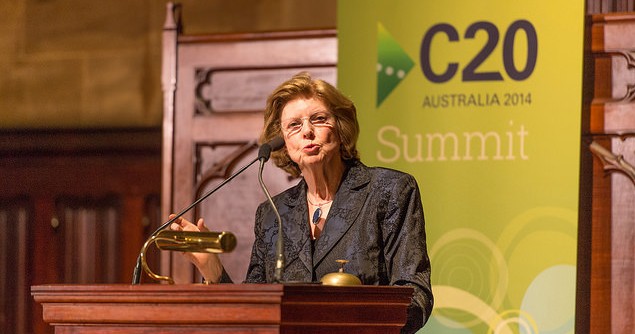G20: Stopping the Rot

The message is blunt – if we want a stronger, fairer and more functional global economy, then stamping out corruption and white-collar crime has to be an ongoing priority of the G20, states Huguette Labelle.
Transparency International is a non-governmental organisation that monitors and publicises corporate and political corruption in international development. As our vision suggests, we strive for “a world in which government, politics, business, civil society and the daily lives of people are free of corruption”. In November 2010, we issued a declaration calling on governments and financial institutions to do more to repatriate the proceeds of corruption that are kept overseas, known as stolen assets. At the same time, the G20 Toronto Summit, announced for the first time that they were making the fight against corruption a priority. Given that corruption generates such a wide negative impact, to tackle it proficiently requires an engaged group and one with as large a reach as the G20.
Australia pins on its deputy badge
Transparency International warmly welcomed the establishment of the Anti-Corruption Working Group at Toronto’s 2010 Summit and the first Anti-Corruption Action Plan at Seoul in November 2010, renewed in Los Cabos in 2012. These efforts underscore the recognition that anti-corruption work is closely connected to the global financial and economic reform process and thus central to the G20 agenda. Now, under Australian leadership, the G20 must take stock of the progress made over the last four years – it must decide where and how to channel its energy in coming years to ensure that commitments are turned into lasting action in each of the G20 national capitals.
Corruption cuts to the core
The dual guiding themes of this year’s G20 presidency promote stronger economic growth and enhanced resilience of the global economy to destabilising shocks. Tackling corruption is crucial to both generating growth and establishing a cleaner, safer, more sustainable economic framework. Corruption distorts markets, undercuts business and undermines a level playing field. And, according to the Washington-based group Global Financial Integrity, the scale of black money leaving developing countries through illicit flows such as tax evasion and money laundering could be almost six trillion dollars over the last decade.
Strong anti-corruption practices are therefore necessary to create a stable, reliable investment climate that is more resistant to shocks and crises. In a PricewaterhouseCoopers’ survey of more than 390 senior business executives, 45 per cent said corruption risks led them to not enter a market or pursue a business opportunity. Similarly, our own recent survey found that an average of 27 per cent of the respondents within 15 G20 countries believed they had lost business due to corrupt practices. The fight against corruption requires not only new laws and official regulations, but better enforcement, more transparency in government activities and a firm commitment against impunity. As such, there are a number of actions the G20 can take, individually and collectively, to show unity in the fight against corruption.
Tackling corporate secrecy to deal with money laundering and tax evasion
A recent United Nations Office on Drugs and Crime report found that detection rates of illicit financial flows is as low as one per cent. One fundamental loophole in current international standards is the ability for money launderers and tax evaders to hide their identity behind labyrinthine layers of corporate structures. Information is not always collected and rarely published about those who ultimately own, benefit from or control companies and other legal structures. It is crucial that the G20 move towards better enforcement of Financial Action Task Force standards and build from progress delivered at the G8 Summit last year, when individual and collective Action Plans were adopted to tackle corporate secrecy. The G20 should now follow this commitment and promote public registries of beneficial ownership information as a new global standard. A timetable for action should be contained within the work-plan of the G20’s Anti-Corruption Working Group.
Extractive industry transparency
In resource-rich countries, where 680 million people live on less than $2 per day, a number of conditions need to be in place for the extractive sector to contribute to the country’s long-term economic growth and development. A key link in the extractives value chain is transparency of revenue flows between industry and government. A 2012 Transparency International report on the corporate reporting of the world’s biggest companies shows that levels of country-by- country reporting are very poor. These gaps pose significant corruption risks. The G20 can address this oversight by adopting a global standard of mandatory disclosure of payments and operations on a project-by-project and country-by-country basis.
Whistleblower protection
One of the most tangible and specific commitments in the current Action Plan commits G20 countries to “enact and implement whistleblower protection rules”. Whistleblowers play a key role in exposing otherwise unknown acts of corruption or other wrongdoings – often at high personal risks. Alas, current legislation in most G20 countries is weak or non-existent. So they should pass and implement loophole-free, stand-alone whistleblower protection legislation for all public and private-sector employees that ensures prompt, effective and independent follow-up and includes full legal remedies in case of retaliation.
Looking forward
Transparency International would warmly welcome the adoption of a successor to the current Anti-Corruption Action Plan that comes to an end this year. It should build on ongoing work, and in order to see tangible success, future commitments must be focused and realistic within a two-year framework. However, these are just a few of our priorities for 2014 and beyond. Others include tackling foreign bribery, recovery of stolen assets and promoting public and private sector integrity – in infrastructure projects, for example. Such Collective Action strategies, which depend upon joint action from civil society, business and government sectors, are crucial to success.
The challenges our world faces today are great, but if the world’s leading economies can deliver on the promises made in recent years they can have a positive impact not just on their own economies but on global efforts to promote sustainable economic progress. We look forward to continued fruitful engagement with the G20, C20, B20 and others throughout the course of the year.
Huguette Labelle is Chair of Transparency International.
This is an extract from G20: Words into Action Brisbane 2014, to be published by Faircount Media in association with the Australian Institute of International Affairs in October 2014.





